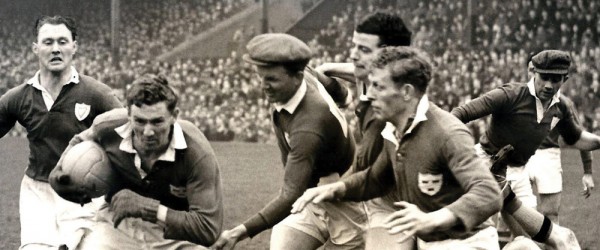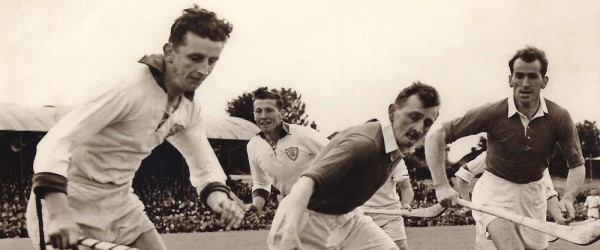(This appreciation of Jimmy Doyle by Denis Walsh was published in the Sunday Times on June 28, 2015
and is reproduced her by kind permission.)
Though the game changes the makings of brilliance are not revised from one generation to the next. There is an empirical standard that holds. The prime of Jimmy Doyle’s career was only captured in passing on television and for any hurling follower born in the last 50 years Doyle’s genius was not a spectacle to which you could give witness-testimony. Reasons to doubt it, however, were never raised. Doyle’s brilliance carried on, effortlessly time-travelling. *
He wasn’t one of those players who was of his era. He transcended the dating process. You could even argue that Doyle prospered in spite of the era in which he played. He was on the short side of medium height; not light but not powerful either. He wasn’t built to defend himself with force even if he had been inclined to do so. Blackguarding of forwards went on wholesale in those days and it was met with light touch regulation. Doyle absorbed it. *
The bullet-point version of his career doesn’t need any translation. In 1957 he played minor and senior championship for Tipperary on the same day. How many players in the history of the game did that? Maybe a handful. Babs Keating remembers him playing junior for Tipp against Cork in 1956, little more than a boy against men in an unforgiving grade. “It was like Messi being put in against Cobh Ramblers,” says Keating. *
Another bullet-point: the 1958 All-Ireland semi-final between Tipp and Kilkenny was played in appalling rain and Doyle, though still a teenager, would already have been a marked man. In those circumstances he would have been entitled to all kinds of allowances: he didn’t need any of them. Tipp won a low-scoring match by five points and Doyle scored 1-8, precisely the score that Kilkenny managed all told. He arrived with the temperament for the big stage and a career on Broadway, type cast from the start. *
Precocity and longevity don’t always follow in sequence. The truly great players put them together. Doyle played long enough for the third man tackle to be abolished, even though in later interviews he lamented its passing. It didn’t stop him. He was playing a different game to the terrorists. *
“He was the classiest hurler I ever saw,” wrote Keating in his autobiography. “When it came to real skill he was the [Seve] Ballesteros of hurling, he had all the shots. He was the complete hurler when it came to shots. He had shots no one else had, he used his hands like no one else could…Whenever I watch Stephen Hendry play snooker and see him planning I think of Jimmy Doyle. He was always thinking a few shots ahead.” *
In Diarmuid O’Flynn’s wonderful book, The Warrior Game, Doyle gave an insight into his match play. “You had to be elusive,” said Doyle, “you had to be able to lose your man. Martin Coogan [from Kilkenny] was one of the best left half backs of all-time and he told me he could never keep an eye on me. ‘Jimmy,’ he said to me, ‘every time I turned around, even for a split second, you were gone.’” *
Doyle’s game wasn’t a confection of tricks but he had such command over the ball that he could do anything. “I could make the ball talk,” he told O’Flynn. “I could bend it, put top-spin on it, anything I wanted. That was from training on my own…I lived with the hurley. I still have my hurley [he said, in his late 60s]. I have two in fact, one beside the bed and one in the boot of the car. I’m looking at the hurley, always.” *
Back when the Railway Cup was a serious competition with huge public appeal Doyle told a story of a match against Leinster who had the great Ollie Walsh in goal. He ran straight through on Walsh, threw the ball up, drew hard with his left as if he was about to strike but swung under the ball; anticipating the shot, Walsh committed himself and Doyle put the ball in the other corner. Later in the same match he did it again: same trick, same outcome. *
The numbers that underpinned his genius stand up against any of the great players from any generation. According to Leo McGough’s precious archives Doyle started 36 championship matches in the Tipperary attack and scored from play in 30 of them. Imagine the pressure he was under: from opponents, from his own crowd, from relentless expectation. *
His brilliance carried it. *





